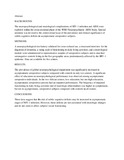| dc.description.abstract | BACKGROUND:
The neuropsychological and neurological complications of HIV-1 infection and AIDS were explored within the cross-sectional phase of the WHO Neuropsychiatric AIDS Study. Special attention was devoted to the controversial issue of the prevalence and clinical significance of subtle cognitive deficits in asymptomatic seropositive subjects.
METHODS:
A neuropsychological test battery validated for cross-cultural use, a structured interview for the diagnosis of dementia, a rating scale of functioning in daily living activities, and a neurological module were administered to representative samples of seropositive subjects and to matched seronegative controls living in the five geographic areas predominantly affected by the HIV-1 epidemic. Data are available for five centers.
RESULTS:
The prevalence of global neuropsychological impairment was significantly increased in asymptomatic seropositive subjects compared with controls in only two centers. A significant effect of education on neuropsychological performance was observed among asymptomatic seropositive individuals. In the two African centers, low-education, but not high-education, asymptomatic seropositive persons had an impaired performance. The frequency of impaired functioning in daily living activities and of neurologic abnormalities was higher in symptomatic, but not in asymptomatic, seropositive subjects compared with controls in all centers.
CONCLUSIONS:
These data suggest that the risk of subtle cognitive deficits may be increased in asymptomatic stages of HIV-1 infection. However, these deficits are not associated with neurologic changes and do not seem to affect subjects' social functioning. | en |

